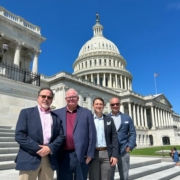The American Trucking Association, in cooperation with the National Tank Truck Carriers, Truckload Carriers Association and the Trucking Association of Massachusetts (TAM), wrote to Massachusetts Governor Maura Healey referencing the federal Infrastructure Investment & Jobs Act. The act provides significant resources to state and local governments to address truck parking capacity.
The letter encourages the governor to use these resources, as well as other non-federal resources, to prioritize and address this serious safety problem.
Below is the text of the letter to the governor.
Dear Governor Healey,
The American Trucking Associations, our state partners and other affiliated organizations represent the interests of trucking companies and their employees. This includes 3.5 million truck drivers who are the unsung heroes of our supply chain, each year driving over 320 billion miles to deliver roughly 12 billion tons of freight. Every one of those miles represents a stocked store shelf, a package placed on a household doorstep, materials delivered to a manufacturer, and equipment conveyed to a construction site. These professional men and women deliver the goods we rely on safely, securely, and on time while serving as role models in their communities. Too often, however, drivers are unable to find a safe place to rest after a long day on the road due to a severe shortage of truck parking. We are asking for your assistance with this longstanding and growing safety problem.
According to the U.S. Department of Transportation (USDOT), 98 percent of truck drivers regularly experience difficulty finding safe parking—a sharp uptick from the 75 percent figure reported just four years earlier. USDOT also found that the truck parking shortage exists in every state and region. Year after year, truck drivers have indicated that the parking shortage is one of the top three challenges they face, rising to number one in 2022. With the volume of freight moved by trucks expected to increase by more than 21% over the next decade, this problem is only going to get worse.
The lack of available truck parking has dire safety implications for both truck drivers and the motoring public. When drivers are unable to find safe, authorized parking, they are stuck in an untenable situation, forced to either park in unsafe or illegal locations, or violate federal hours-of-service regulations by continuing to search for safer, legal alternatives. As a last resort, drivers reluctantly park in unsafe locations—such as highway shoulders, interstate entrance and exit ramps, and abandoned properties—creating heightened safety risks for themselves and other motorists. The hazards of the parking shortage were sadly brought to the nation’s attention in July, when three passengers were killed and many others seriously injured after a Greyhound bus hit three tractor-semitrailers parked on the shoulder of a rest area’s exit ramp on I-70 in Illinois. The drivers were forced to park on the shoulder when the rest area filled up.
Drivers do not park in these locations by choice. One survey found that 84% of drivers feel unsafe when parked in unauthorized areas, and this is especially true for female truck drivers. Law enforcement officers also face a difficult decision: either force truck drivers to relocate, placing them in violation of HOS rules and taking a risk that the drivers may be too fatigued to drive safely, or allow the drivers to remain parked illegally. The bottom line is that safety is compromised when truck parking is not readily available.
Fortunately, with the passage of the Infrastructure Investment & Jobs Act (Public Law 117-58), significant resources are now available to state and local governments to address this critical challenge. Construction of new truck parking capacity at rest areas or adjacent to private facilities is eligible for funding, as are improvements that allow for increased parking capacity at nontraditional locations, such as weigh stations and commuter lots, when appropriate. According to a memorandum issued by the U.S. Department of Transportation on September 20, 2022, these resources are available under several federal-aid highway programs, including:
- National Highway Performance Program;
- Surface Transportation Block Grant Program;
- Highway Safety Improvement Program;
- Carbon Reduction Program; and
- National Highway Freight Program.
Additionally, transportation agencies can apply to USDOT for grants under a number of discretionary programs, including:
- Nationally Significant Multimodal Freight & Highway Projects Program (AKA INFRA);
- National Infrastructure Project Assistance (Mega) Program;
- Local and Regional Project Assistance Program (AKA RAISE); and
- Rural Surface Transportation Grant Program.
Several federal formula and discretionary programs are available for funding additional improvements, such as electrification, resiliency and technology solutions.
Some states have already utilized these resources to increase parking capacity or improve the operational efficiency of existing facilities. This includes at least half a dozen projects funded by federal grants and several more paid for through states’ federal-aid highway formula dollars.
Beyond these familiar DOT funding streams, the Department of the Treasury recently confirmed the eligibility of COVD-19 funds awarded to states and local agencies for infrastructure projects. In this notice, Treasury clarified that state and local government agencies that have unspent money from their Coronavirus State and Local Fiscal Recovery Funds (SLFRF) can use a portion of those resources for investment in infrastructure, which could include truck parking facilities.
Truck drivers are the backbone of our society and our economy. Without them, the daily conveniences we take for granted—from fresh water to fuel to the literal roofs over our heads—would not exist. We urge you to examine the availability of truck parking within your State and take such actions as are necessary to ensure that truck drivers have a safe place to sleep when they are out on the road delivering more than 70% of America’s freight. We hope you will use the aforementioned resources, as well as other non-Federal resources, to prioritize and address this serious safety problem. If you would like to discuss this issue further, please contact us directly.
Sincerely,
Chris Spear
American Trucking Associations
Kevin Weeks
Trucking Association of Massachusetts
Ryan Streblow
National Tank Truck Carriers
Jim Ward
Truckload Carriers Association
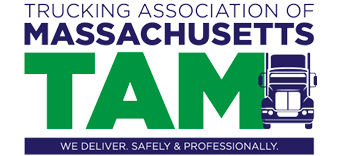
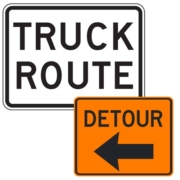

 Advantage Truck Group was founded in 1984 in a two-pumper service station with $12,000, Kevin Holmes’s life savings. He was undercapitalized, but he jumped in anyway.
Advantage Truck Group was founded in 1984 in a two-pumper service station with $12,000, Kevin Holmes’s life savings. He was undercapitalized, but he jumped in anyway.

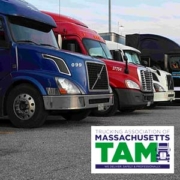

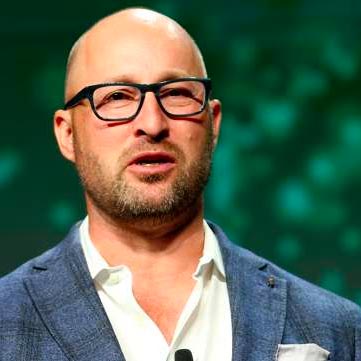 We are pleased to announce TAM’s own Andrew Boyle of Boyle Transportation has been elected as Chairman of the American Trucking Associations.
We are pleased to announce TAM’s own Andrew Boyle of Boyle Transportation has been elected as Chairman of the American Trucking Associations.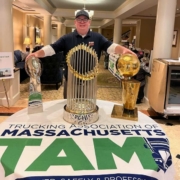
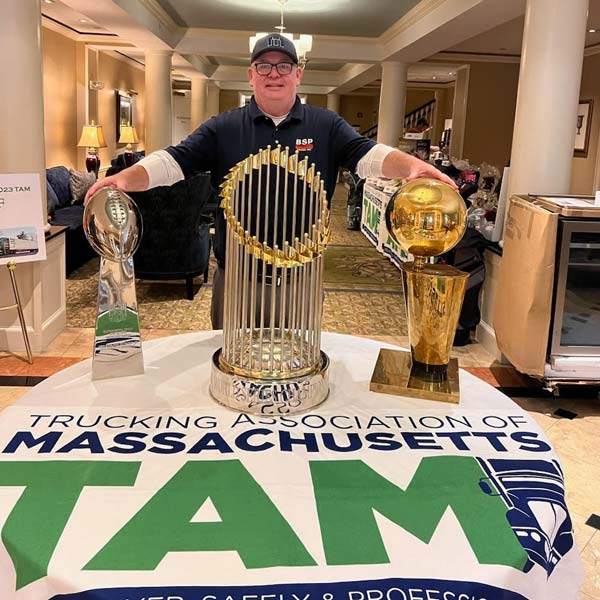 Thanks to everyone who participated in this year’s Golf Event, our biggest field ever, despite the lack of sunshine. While it was a little damp, we still had a great time and, just as importantly, raised over $3,200 for our scholarship fund.
Thanks to everyone who participated in this year’s Golf Event, our biggest field ever, despite the lack of sunshine. While it was a little damp, we still had a great time and, just as importantly, raised over $3,200 for our scholarship fund.